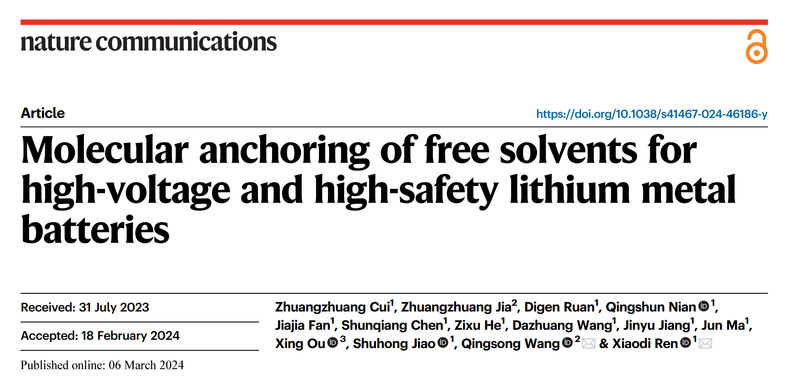

Constraining the electrochemical reactivity of free solvent molecules is pivotal for developing high-voltage lithium metal batteries, especially for ether solvents with high Li metal compatibility but low oxidation stability ( <4.0 V vs Li+/Li). The typical high concentration electrolyte approach relies on nearly saturated Li+ coordination to ether molecules, which is confronted with severe side reactions under high voltages ( >4.4 V) and extensive exothermic reactions between Li metal and reactive anions. Herein, we propose a molecular anchoring approach to restrict the interfacial reactivity of free ether solvents in diluted electrolytes. The hydrogen-bonding interactions from the anchoring solvent effectively suppress excessive ether side reactions and enhances the stability of nickel rich cathodes at 4.7 V, despite the extremely low Li+/ether molar ratio (1:9) and the absence of typical anion-derived interphase. Furthermore, the exothermic processes under thermal abuse conditions are mitigated due to the reduced reactivity of anions, which effectively postpones the battery thermal runaway.
这篇论文提出了一种新的分子锚定方法,用于限制低浓度电解液中自由溶剂的界面反应活性。这种方法通过氢键作用有效地抑制了醚类溶剂的副反应,提高了高镍正极材料在高电压下的稳定性,并且减少了在热滥用条件下的放热反应,从而推迟了电池热失控。研究结果表明,这种分子锚定电解液(MADE)具有更宽的电化学稳定窗口和更高的热失控温度,为开发高能量密度和高安全性的锂金属电池提供了有前景的策略。这项工作不仅克服了传统低浓度醚基电解液的电压限制,而且为电解液的设计和界面调控提供了新的视角,并对实用条件下锂金属电池的安全运行提供了重要的见解。



